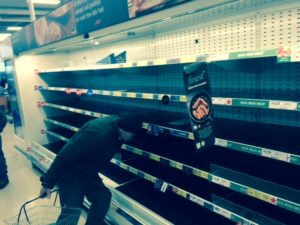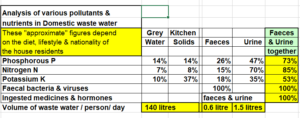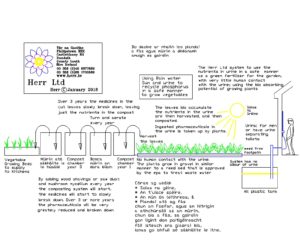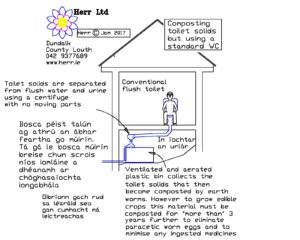United Nations Sustainability Goal 6 Water A Challenge for New House Building
United Nations Sustainability Goal 6 Water A Challenge for New House Building
- To end the wasting and dumping of phosphates, nitrates and potash from septic tanks into the ground
- To protect the water quality in nearby rivers from these nutrient pollutants
- To play a part in returning streams and rivers to their former pristine unpolluted condition and
- To increase recycling and the safe reuse of nutrient materials to avoid a future food security crisis in Ireland
The UN and the European Union are now calling on us all to change the way we manage domestic waste water. They are calling on us to have sustainability and recycling as a high priority when we are designing domestic waste water treatment systems https://sustainabledevelopment.un.org/sdg6 In section 3 it states as follows:
“By 2030, improve water quality by reducing pollution, eliminating dumping and minimizing release of hazardous chemicals and materials, halving the proportion of untreated wastewater and substantially increasing recycling and safe reuse globally”
Septic Tanks are not effective in preventing all of the pollution In Ireland at present we are misguided in relying on septic tanks as the best or only way to reduce waste water pollution. Septic tank systems result in valuable materials and minerals being dumped. Materials such as nutrients of Phosphorus and Nitrogen from the septic tanks are discharged into the soil percolation system and end up lost, wasted or “land filled” in the ground. In ideal percolation conditions, most of the phosphorus will be captured and locked up in the soil and most of the Biological Oxygen Demand (BOD) in the waste water will be greatly reduced. In good percolation soil they do have merit certainly as a way to reduce these two fractions of water pollution, but most of the nitrate for example will still be able to pass through the ground and end up in the water table, potentially re-emerging in nearby rivers and lakes.
Septic Tank Problems Our difficulty is that there are very many places in Ireland where the percolation characteristics in the ground are not perfect and the water table below ground is therefore being polluted with both nitrates as well as phosphates. Unless the soil conditions are perfect, the nutrients that are present in the effluent from Irish septic tanks can still become a diffuse pollutant source that gradually impacts in local streams. Irish EPA funded research has been carried out in Ireland on this matter. https://www.epa.ie/pubs/reports/research/water/Summary_Findings_91-Summary_Findings.pdf At one point in this study they state that “The contribution of septic tanks to high phosphorus concentrations in rivers, particularly as constant point sources during low flows in the summer months, was a recurring theme..” I believe therefore that there are further steps that should be taken to manage nutrients when building new houses
There is a further issue that we must address. There is a growing concern at the amount of ingested pharmaceuticals that many of us excrete and that end up in our rivers. These hormones, medicines and even antibiotics are being measured down stream of municipal sewage treatment systems. The problem is coming to the attention of scientists in Ireland http://www.irishtimes.com/news/science/the-undiluted-truth-about-chemicals-in-our-waters-1.439674 It’s possible therefore that these well diluted excreted medicines are also coming from local domestic septic tanks. They could pass through the ground and re-emerge in our drinking water, particularly if the percolation characteristics in the soil are not ideal and there is a stream or river nearby.
Yes we continue with the current practice of mixing “all” of the domestic waste water streams (urine, faeces and grey water) and passing them through the one septic tank. By so doing so we are in breach of the UN Sustainability Goal for water. We are destined to continue contributing to the growing pharmaceutical pollution in water as well as dumping and not recycling phosphates and nitrates.
The need to recycle Phosphates and Nitrates from domestic wastewater
The European Phosphorus Platform along with the UN Sustainability Goal 6, 3 is now also asking EU member states and organizations to recycle materials from water and phosphate nutrients in particular.
They are calling for phosphorus to be recycled because Europe has so little mineral phosphorus of its own. The economically available resources of phosphate to make fertilizer are finite and exist in only a few other countries outside the EU. Please note also that to make nitrite or ammonia fertiliser we still require to burn coal or natural gas. In addition to the coming end of low cost phosphorus, natural gas and coal reserves is projected to come to and end also. The estimations for the end of these materials and mineral resources are stated in the Guardian Newspaper. “The six natural resources most drained by our 7 billion people” https://www.theguardian.com/environment/blog/2011/oct/31/six-natural-resources-population Please remember that it’s more important to think about the point in time when the price for these resources becomes too expensive in the world market as a result of growing supply shortages to meet this demand.
Avoiding a fertiliser and food crisis With 7 billion people on the earth we cannot continue to rely on animal manures alone to fertilise food crops for our growing world population. It takes millions of years for nature to make the phosphorus rock that we are now so quickly mining and wasting. Eventually at current extraction rates, the remaining economically viable phosphate mines will eventually be depleted. With continuing population increase, and assuming no new phosphorus resources are found, how will we manage? How will the millions of people living in the large cities be able to buy increasingly expensive food? How will they manage if the supermarket food is unaffordable? Can we be certain in the future about having affordable food if we don’t recycle nutrients from waste water? Will our supermarket shelves become more frequently empty?
The European Phosphorus Platform is active in highlighting this problem and promoting solutions. https://www.phosphorusplatform.eu/links-and-resources/p-facts Some experts argue that the cost of fertiliser will soon become very expensive as the world market demand continues to increase and the remaining available resource starts to become scarce. These experts argue the possibility that world fertilizer prices and food prices could increase in perhaps the next 4 decades. It’s time now to provide these phosphorus and nitrogen recycling systems in new suburban and rural houses.
When Irish people finally decide that phosphorus and nitrogen should not be wasted or lost in the ground or end up in the aquatic environment, when we finally decide that we want a return of pristine water conditions in our rivers and streams; where then are these nutrients in waste water going to go?
We know that by simply removing urine and faeces from being mixed with the rest of the waste water that the greater proportion of waste water pollution from the new house can be avoided. 

From these figures it follows that by properly separating and individually treating the urine and the toilet solids, that we can avoid a very large proportion of the domestic waste water pollution. We can also avoid the dumping of ingested pharmaceuticals that so often reappear in or rivers. We will also be better able to recycle the nitrogen and potassium that we took in through our diets. By recycling these elements we can grow enough food sustainably into the future. In this way by complying with the UN Sustainability Goal 6 for Water we will also be keeping our rivers clean and our drinking water safe. We will be playing our own part in protecting the world from future food shortages.
Preventing Pharmaceuticals from entering the food chain. If the treated human excrement is being considered as a fertilizer, an extra treatment stage of prolonged composting is required to substantially reduce or remove any ingested pharmaceuticals or antibiotics. The composting of animal sludge and manures has been studied as a successful way to eliminate antibiotics before application back onto farm land. In taking the maximum precautions, a much longer composting period of no less than 3 years should therefore be used as a extra safety measure before using human excrement waste containing ingested pharmaceuticals to grow kitchen food crops.
Does composting reduce antibiotics or antibiotic resistance in animal manure? https://johnpaulprofessional.com/2015/08/10/does-composting-reduce-antibiotics-or-antibiotic-resistance-in-animal-manure/

My own view is that it is unrealistic to expect or to depend on the Irish Government to ban urine from going into septic tanks. For this reason I’m doubtful that Government action will be soon or effective enough in returning our rivers and lakes to their former pristine conditions. I don’t believe that recycling phosphorus from city sewage treatment plants will be enough to grow food for everyone else living outside cities. The Government have not begun a national program to collect sewage sludge from rural septic tanks yet. It’s equally unrealistic then to expect the Government with all its current problems to promote programmes to recycle phosphorus and nitrogen in small rural or isolated communities. United Nations Sustainability Goal 6 for Water will not be promoted by the Government in Ireland for rural houses and communities until international phosphate prices reach an all time high. By then it may be too late to avoid serious food price inflation. People on low incomes will be spending a very large proportion of their take home salary on just buying food.
As the price of food becomes too expensive in supermarkets then people on low or medium incomes everywhere will start to grow their own vegetables in their own gardens. Lawns will be dug up to be replaced with vegetable gardens. Except that you have plenty of space for your own hens and pigs, you should install a system to recycle nutrients from the humans in your own home now. Don’t leave it too late. If you can afford it at all, it’s time to invest now in a system to recycle nutrients form urine and to avoid a future food cost crisis for you and your own family.

